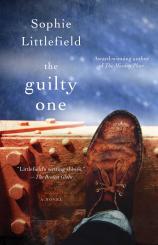Reading Group Guide
Discussion Questions
The Guilty One

1. In the opening pages describing Ron’s suicide attempt, Maris refers to Ron simply as “her friend” (p. 19). How does her choice of words set up your understanding of their connection throughout the book?
2. Events only gradually reveal themselves as the story progresses. Why do you think the author chose to unveil what happened to the Vacanti and Isherwood families in this way? How did your opinion about what happened between Karl and Calla evolve during your reading of the book?
3. Ron believes “it was a mother’s job to defend her offspring, just as it was a father’s job to provide expectations and consequences” (p.63). Do you agree with this point of view? In what way do you think Ron was predisposed to believe Karl’s guilt?
4. Ron believes that his father had a direct impact on his ability to form a relationship with his son, and in many ways this failure to bond contributed to Calla’s death. Is this a reasonable sentiment?
5. Maris takes the axiom of a clean start very literally when she moves into the apartment in Oakland. In what way do reminders of her life before the murder hinder her progress and in what way are they an important bridge? Is this something you can relate to?
6. During Ron’s first visit to Karl in prison he’s more concerned with how others view him than what his son thinks. Is this un- expected from what we know of his life thus far? What does this say about him as a person and a father?
7. We get to know Maris and Ron very well from their interior dialogues and points of view, but we also get the chance to see them through each other’s eyes. What surprised you about how they saw each other? Did this affect your view-point in any way?
8. Throughout the book, we catch glimpses of the dynamic between Ron and Deb prior to the murder and how it has changed after Karl’s conviction. In what ways did Karl’s incarceration immediately change their relationship, and what aspects can be interpreted as a natural progression from the events of the school trip?
9. Both Maris and her sister are the products of sperm donors. In what way do you think that shaped their upbringing? Why do you think Sophie Littlefield made that decision?
10. How did the revelation of why Maris and Jeff’s marriage disintegrated change your understanding of the first half of the book?
11. The “Guilty One” can refer both to the perpetrator and one who feels guilt. How does the author use this dual meaning when exploring the aftermath of a heinous crime? In your mind, who is the Guilty One that the title refers to?
12. At the end of the book Ron contemplates getting to know his son again after five years in jail. In light of what you know happened the night Calla died, do you think Karl deserves to be released so soon? Or is five years too long?
13. Like Ron, Pet has an unstable parent who is emotionally abusive, but she manages to live her life in a relatively well-adjusted manner. Do you think if Ron had a similar support system in his twenties he would be less emotionally closed off? Or are their responses to their respective upbringings a result of their distinct personalities?
14. At the end of the book, Maris is able to redefine who she is, now that the old labels that applied to her life are no longer valid. Do you think this transformation would have been possible had Calla not been murdered?
Enhance Your Book Club
1. The events depicted in the book closely mirror those examined in the critically acclaimed and popular podcast “Serial.” Listen to the first episode of “Serial” as a group and discuss how the media sensationalizes high school murders and the difficulty of prosecuting these kinds of cases.
2. One of the coping mechanisms Maris is given is to pick a positive thing she did and say it out loud. Go around the room and pick a positive thing that you did this week and review why that enhanced your overall mood.
3. Recent research has shown that many adolescents’ brains continue to develop into their mid-20s, especially the areas that contribute to reasoning, judgment and impulse control. Take a look at past cases where teenage brain development was used as part of the courtroom defense and apply them to THE GUILTY ONE. Could this defense have been used as part of Karl’s trial?
The Guilty One
- Publication Date: August 11, 2015
- Genres: Fiction, Psychological Suspense, Psychological Thriller, Suspense, Thriller
- Paperback: 304 pages
- Publisher: Gallery Books
- ISBN-10: 1476757836
- ISBN-13: 9781476757834








